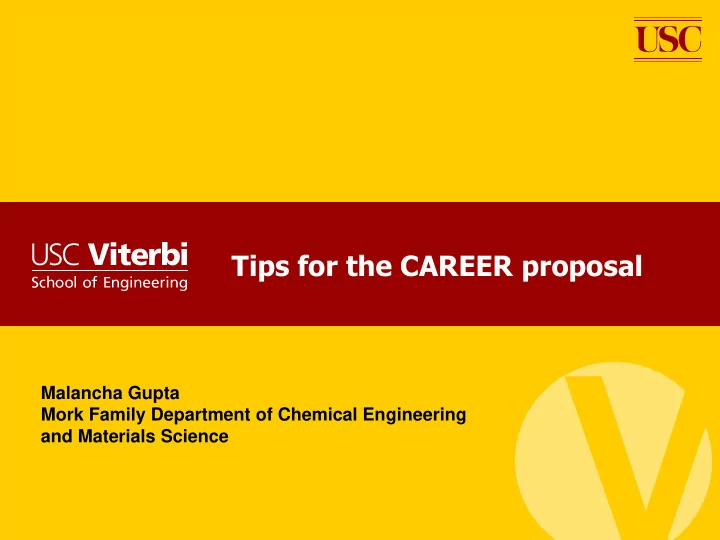

Tips for the CAREER proposal Malancha Gupta Mork Family Department of Chemical Engineering and Materials Science
My Background • Received my PhD in chemical engineering from MIT in 2007 • Conducted 2 years of postdoctoral research in chemistry at Harvard from 2007-2009 • Started faculty position at USC in the chemical engineering and materials science department in 2009
History with NSF grants • I applied for a CAREER award in 2009 before I started my faculty position, but I did not get it • I served on several CMMI and CBET panels in 2010 and 2011 • I kept applying for non-CAREER grants • I received a CMMI grant in 2011 • I went to the NSF CAREER workshop in Reno in 2012
Research Plan Goal: understand the kinetics and mechanisms associated with introducing micron-scaled porosity into vapor deposited films Experimental approach: use extremely low substrate temperatures to freeze the monomer while simultaneously polymerizing it
Advantages and Applications Key Advantages • Solvent is not required and therefore monomer/polymer solubility is not an issue • Bottom-up process allows for the production of porous-on-porous materials Potential Applications • Microfluidic Devices for Point-of-Care Disease Detection • Membranes for Water Purification
Integrated Educational Plan • Develop a multi-tiered mentorship program aimed at recruiting, retaining, and advancing female undergraduate and graduate students in engineering fields • Develop hands-on experiments for K-12 outreach in downtown Los Angeles Coffee Filter Let Solution Food Wick into Coloring Channel
Start Early • You must start your proposal early • It is always good to get other people’s input— they can help you decide what is relevant and interesting — you must give them time to proofread • 15 pages is very short! — you need time to cut down the information
Experimental Plan • Highlight the new aspects of your research • Where is your field today? • How is your proposed approach different? • How does your CAREER proposal differ from your previous work as a graduate student and/or postdoc? • How does your CAREER proposal differ from your previous funding?
5-10 Year Plan • The CAREER grant is different from other grants – they are funding your long-term research goals, not a specific project • Explain how your proposed research fits into your 5-10 year career trajectory • Explain why you are the right person to tackle this project
If successful, so what? • Answer: If successful, so what? • What applications might benefit from your proposed work? • What fundamental insight will be gained from your proposed work? • What broader impacts will you achieve? NOTE: This is what reviewers will be asked about your proposal.
Details • Add a timeline of your proposed experiments • Show some proof-of-principle experiments, particularly if your idea is novel and it is not obvious that it will work (note: this is my suggestion) • Give examples of model systems that you will study
Broader Impacts • First discuss your prior outreach experience • Have you volunteered at local museums or high schools? • Have you mentored undergraduate students? Where are they now?
What will you do next? • Pick a project that you are excited about • Are there programs at your university that can help you implement your project? Get support letters. • Why is your project important? Cite literature to show how your project might influence society • Add some preliminary K-12 outreach experiments
In summary….. • Highlight throughout your proposal how the CAREER award will help you establish your long-term career goal to be a leader in your field. • Highlight the scientific impact -- both fundamental and applied • Highlight the broader impacts of your study GOOD LUCK!!!!!!!
Recommend
More recommend